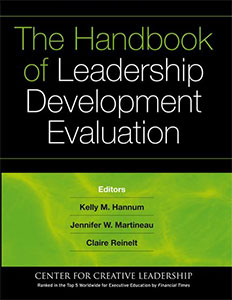Introduction
Is evaluating the leadership development process valuable? Though evaluation is often neglected or even misused, measuring impact can and should be an engaging activity that leads to powerful learning and well-informed action.
Evaluation is the process of collecting and synthesizing information or evidence. As investments in leadership development have increased, so has the need for evaluating that development.
Stakeholders at all levels want to know if what they are doing is having an impact. Funders and senior management wonder if their investment produces results. Designers of program initiatives seek to prove the value of their efforts. Participants want to know if their lives will change for the better.
 The push to demonstrate the value of leadership development programs has generated more interest in training evaluation, drawing attention to books like our widely used Handbook of Leadership Development Evaluation.
The push to demonstrate the value of leadership development programs has generated more interest in training evaluation, drawing attention to books like our widely used Handbook of Leadership Development Evaluation.
Leadership development is a particularly complex process. Development efforts can seed changes in individuals, teams, organizations, and communities that continue to emerge over time. Evaluating the value of leadership development is a much more useful tool when it is an integrated, ongoing part of the program from the beginning.
The Benefits of Training Evaluation
4 Reasons to Measure Impact
Here are 4 ways in which evaluation benefits leaders, organizations, and communities:
1. Evaluation clarifies outcomes.
Evaluation helps us better understand and document the desired outcomes of leadership development. It can encourage more comprehensive discussions about what works and why. Evaluation seeks to systematize large concepts. It separates real outcomes from wishful thinking, slogans, or vague program aspirations.
2. Evaluation focuses attention.
Evaluation pinpoints needed leadership competencies and directs attention to critical issues. When leadership development efforts use evaluation effectively, there is a clear intention about what to achieve and why. If, for example, a team knows that a goal of their leadership development is to improve group decision-making, then the members of the team can change their behaviors accordingly. If they know they will be evaluated specifically on those behaviors, the impetus is even greater.
3. Evaluation supports ongoing learning.
Evaluation can be used to fine-tune a proposed or existing leadership development intervention. It can provide constructive observation to guide a program’s evolution. Once a program is established, evaluation continues to contribute by helping the program managers optimize their use of resources on behalf of the participants. Just as important, evaluation contributes to a learning mindset — a perspective that values asking questions, assuming multiple perspectives, and challenging assumptions.
4. Evaluation influences future actions and decisions.
Evaluation serves to demonstrate more fully how participants, their organizations, and their communities benefit from their leadership development program experiences. This information can then be used to make choices about future efforts.
Evaluation is learning, and learning is evaluation. So view program evaluation as an integral part of the development process, and you’ll be able to build on what’s working well and eliminate efforts that are less effective.
Ready to Take the Next Step?
Our Talent Development solutions can be customized for your unique context and culture, and our Leadership Analytics Practice experts can help your organization reap the benefits of training evaluation.









